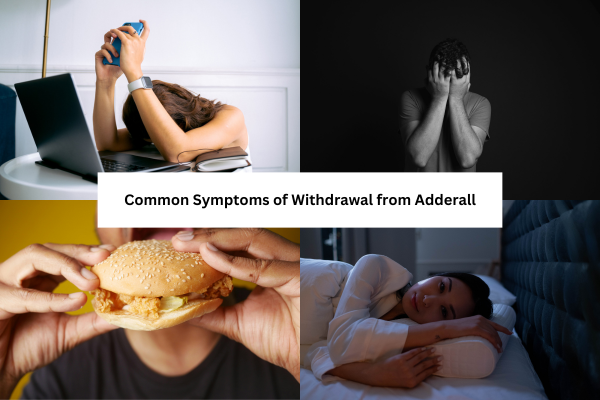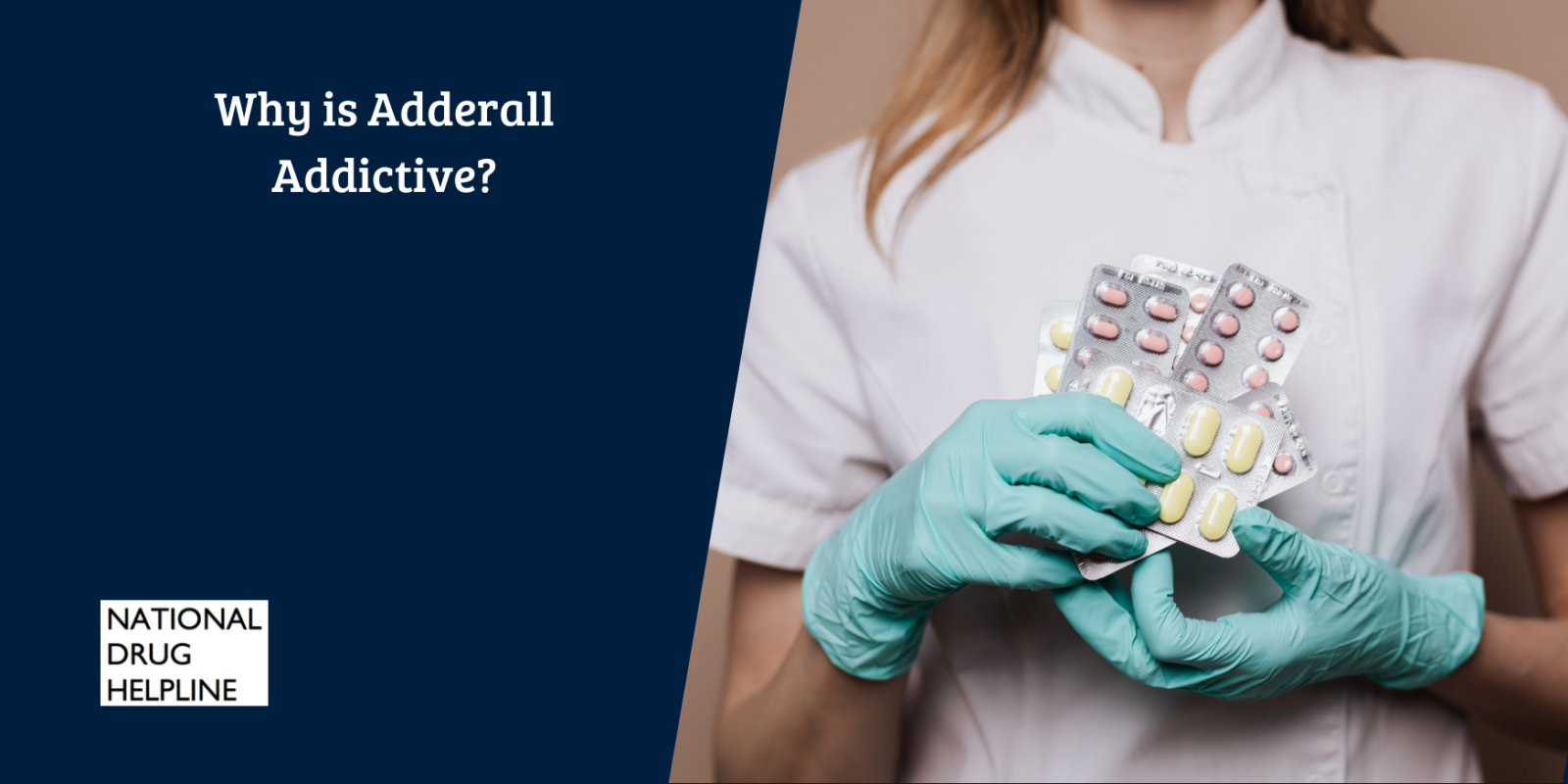Adderall is a medication that is widely prescribed to manage both Attention Deficit Hyperactivity Disorder (ADHD) and narcolepsy. Although it can be life-changing for people with these conditions, there have been rising concerns about misuse and dependence. This has led to a critical question: Is Adderall addictive? To answer this, it is essential to understand the mechanisms behind Adderall’s potential for addiction and the available treatment options. With rising rates of misuse among teens, college students, and adults, learning accurate information on Adderall is vital.
If you or someone you know has been struggling with Adderall misuse, feel free to reach out to Drughelpline.org or call their helpline for immediate support.
What is Adderall?
Adderall is a central nervous system (CNS) stimulant that contains amphetamine and dextroamphetamine. These two compounds work together to increase the levels of two neurotransmitters in the brain, namely dopamine and norepinephrine. For people with ADHD, these neurotransmitters help improve focus, attention span, and impulse control.[1] However, in people without ADHD, this surge in dopamine levels can create a sense of euphoria and enhanced energy, which is what fuels its misuse.
Is Adderall Addictive?
Yes, Adderall is addictive. It can be especially addictive if it is taken in large doses without a prescription or through non-oral methods like snorting or injecting. As Adderall acts on the reward system of the brain, it can cause psychological dependence and physical addiction.
Adderall is taken by many to boost academic or work performance. However, the body tends to build a tolerance to Adderall over time. Higher tolerance requires increasingly higher doses to achieve the same effect. This cycle leads to increased risk of addiction.
Why is Adderall Addictive?
In order to properly answer the question “why is Adderall addictive,” it is essential to understand how it affects the brain. Adderall works by stimulating the release of dopamine, which is the neurotransmitter associated with pleasure, motivation, and reward. In people with ADHD, modulation of dopamine brings brain activity to a more balanced level. In people without ADHD, the artificial spike in dopamine can lead to a powerful euphoric high.
Eventually, the brain begins to adapt to elevated levels of dopamine and starts to depend on Adderall to function normally. Because of this, the brain has to work harder to experience pleasure without the drug. This can lead to cravings, mood swings, and compulsive drug-seeking behavior.
How Addictive is Adderall?
Adderall’s addictive potential is comparable to other stimulants such as cocaine and methamphetamine. However, if it is taken as prescribed, Adderall is milder in onset and severity. [2] But there still is some potential for abuse. This risk is especially high if taken in high doses or over prolonged periods.
Studies have shown that use of Adderall for non-medical reasons is quite common among high school and college students. [3] Many students view Adderall as a harmless study drug, as they are unaware of the consequences of long-term misuse.
Warning signs of Adderall addiction include:
- Taking higher doses than prescribed
- Cravings or obsessive thoughts about the drug
- Inability to reduce or stop usage
- Withdrawal symptoms such as fatigue, depression, irritability
- Continuing use despite negative effects on health or life
Who Is at Risk?
Although anyone can become dependent on Adderall, there are certain factors that increase the risk such as:
- Teens and young adults using it to boost academic performance
- Athletes seeking enhanced focus and energy
- People with a history of substance abuse
- Individuals using Adderall without a prescription
In particular, students may misuse Adderall to increase productivity, as they are not aware of its addictive properties.
What Happens When You Stop Using Adderall?
If you quit taking Adderall abruptly, this can cause withdrawal symptoms, especially if you have been taking it in high doses. This can create a feedback loop, making it even harder to stop taking Adderall. These withdrawal symptoms are also part of what makes the drug so addictive.
Some common symptoms of withdrawal from Adderall are:
- Extreme fatigue
- Depression or mood swings
- Insomnia or excessive sleep
- Difficulty concentrating
- Increased appetite
- Cravings for the drug

How Is Adderall Addiction Treated?
If you want to learn how to treat Adderall addiction, first know that it is entirely possible to recover if you choose effective treatment methods. Some well-established treatment methods include:
Medical Detox
The first step towards recovery is always detoxification. This step helps the body rid itself of Adderall safely. Detox should always be done under the supervision of medical professionals, as there is a high risk of severe withdrawal symptoms.
Behavioral Therapy
Cognitive Behavioral Therapy (CBT) is one of the most effective ways to recover from Adderall addiction. It can help identify triggers of misuse and develop healthier coping strategies.
Support Groups
Support groups and 12-step programs can provide emotional and social support that is much needed during the recovery journey. Just knowing that you are not alone in your struggle can be quite empowering.
Dual Diagnosis Treatment
If you have co-occurring mental health issues such as depression or anxiety, it is important to treat both conditions simultaneously to attain long-term recovery.
Ongoing Monitoring and Aftercare
Successful recovery requires ongoing care and monitoring. Preventing relapse is the most important step for long-term recovery. This may include continued therapy, accountability programs, and family involvement.
Final Thoughts
So, is Adderall addictive? Yes, it can be addictive, especially when misused. The impact of Adderall on the reward system of the brain can make it prone to abuse. This is particularly true in people without ADHD or those using it for non-medical reasons.
If you or a loved one are going through Adderall addiction, you can reach out to Drughelpline.org or call their 24/7 hotline for confidential assistance and treatment options.
References
| ↑1 | Faraone, S. V., and J. Biederman. “Efficacy of Adderall® for attention-deficit/hyperactivity disorder: A meta-analysis.” Journal of Attention Disorders 6.2 (2002): 69-75. |
|---|---|
| ↑2 | Svetlov, Stanislav I., Firas H. Kobeissy, and Mark S. Gold. “Performance enhancing, non-prescription use of Ritalin: a comparison with amphetamines and cocaine.” Journal of addictive diseases 26.4 (2007): 1-6. |
| ↑3 | León, Kenneth S., and Daniel E. Martínez. “To study, to party, or both? Assessing risk factors for non-prescribed stimulant use among middle and high school students.” Journal of psychoactive drugs 49.1 (2017): 22-30. |

